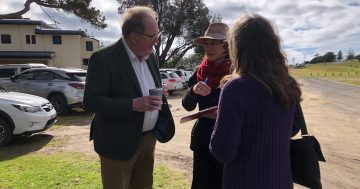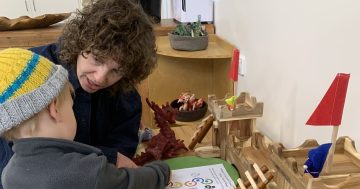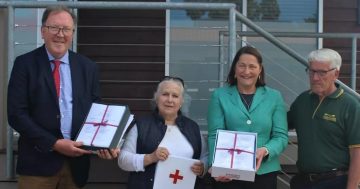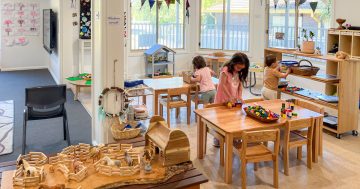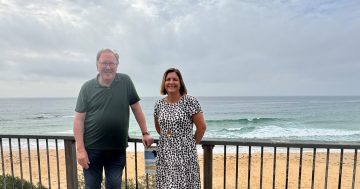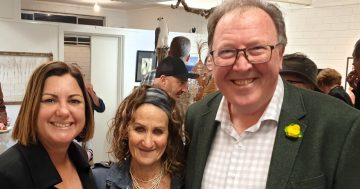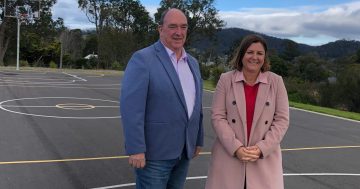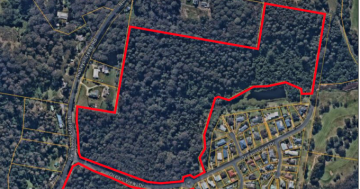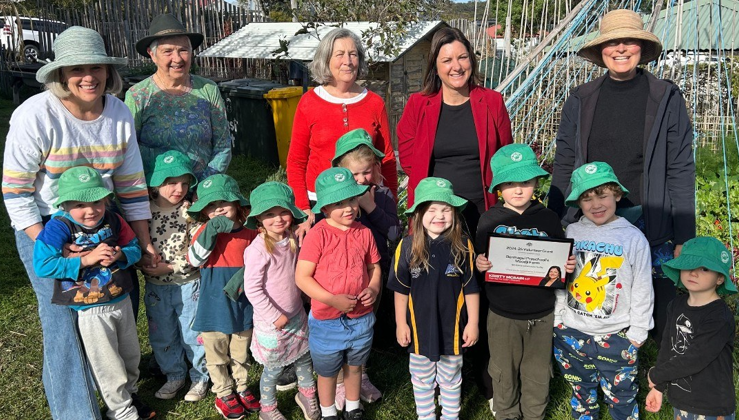
Bermagui Preschool staff and children with Federal Member for Eden-Monaro Kristy McBain who provided $4500 to the preschool’s Moodji Farm. Photo: Supplied.
Bermagui’s children have enjoyed exceptional early childhood education and care for nearly 50 years. However, even tucked away in a little town, Bermagui Preschool is experiencing the same unsustainable pressures that are affecting the sector nationally.
Director/teacher Narelle Myers has been at Bermagui Preschool for 27 years.
“Almost every day it feels there is another story in the media about child safety,” she said. “It highlights long-term systemic failures after decades of complex issues that have led to three fundamental problems.”
Those are putting profit before children, putting compliance before care and an underpaid and undervalued workforce that is leaving the sector in droves.
Bermagui Preschool is a standalone, not-for-profit, community-based early childhood education and care service with 15 qualified teachers and educators. It is licensed for 50 children a day from the age of six weeks to five years old, but currently runs at 70 per cent capacity due to insufficient staff numbers. It has a rating of excellent under the national quality standards.
Ms Myers said that in the 1990s, 90 per cent of preschools were not-for-profit, community-based and government-funded while 10 per cent were private.
“Now that has totally reversed because of a change in government policy and they are increasingly run by big corporate chains while only 10 per cent remain community-based not-for-profits,” she said.
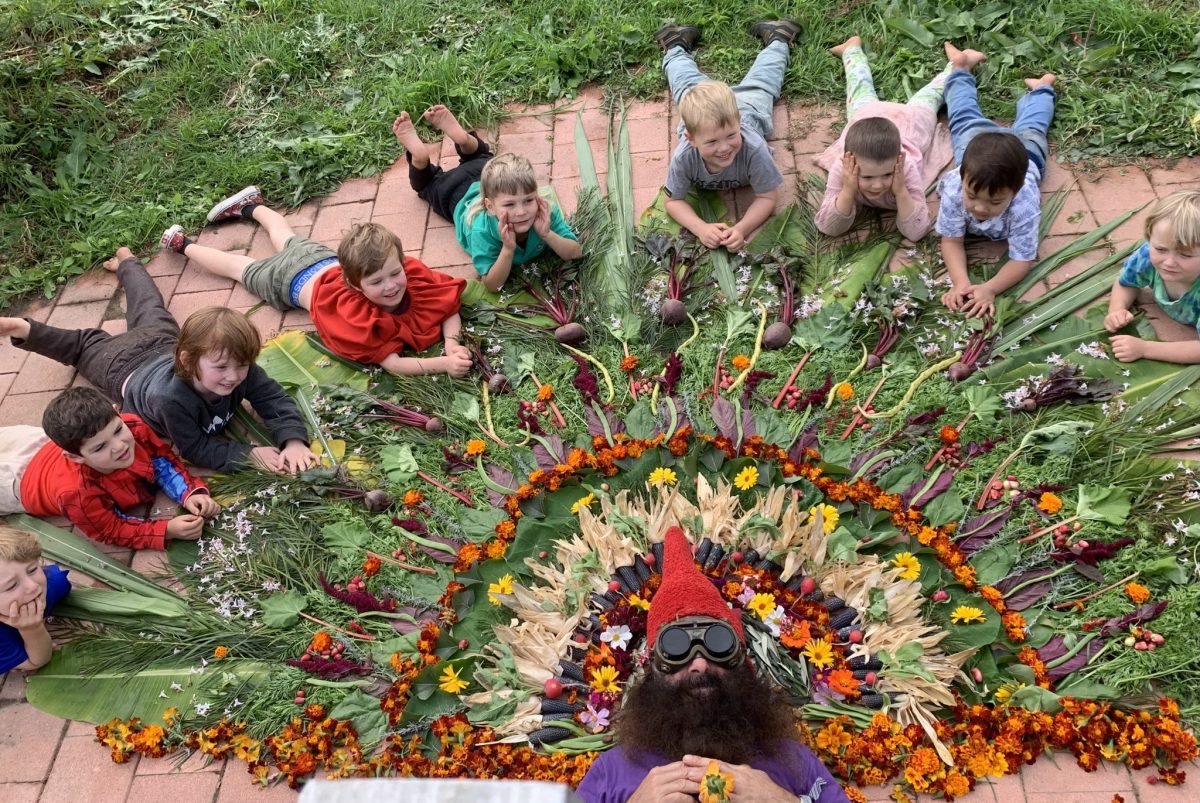
ABC’s Gardening Australia host Costa Georgiadis visits Bermagui Preschool’s Moodji Garden every year. Photo: Eat Dirt Permaculture.
Ms Myers said many people saw the sector as baby-sitting or childcare, but it was part of the education continuum.
“Critical brain development happens in the first five years. That is when those experiences are hard-wired and those brain synapses are formed,” she said.
“I can’t stress how critical that education and care is. We teach children to be life-long learners and give them the skills they need to excel at school.
“The benefits for the community are two-fold: less remedial programs are needed, and improved health, education and employment outcomes for children. There is so much research out there about all the benefits if children get a good start.”
Ms Myers believes that in the private sector, there was growing focus on profit which comes at the expense of service delivery and children. She said Long Day Care relied on the Child Care Subsidy “whereas we rely on government funding and fees from parents which go directly to the children”.
Government funding in the primary and secondary school sectors is expected and should be the standard for children in preschools.
“We know that the first five years are so important, so early education should be funded in the same manner,” Ms Myers said.
She said preschools had a feminised workforce that was underpaid and undervalued. Efforts in the private sector to lift wages and conditions often lead to having more children per teacher or carer, whereas having a smaller number of children allows teachers to be more responsive so they can give the care and education that lead to improved educational outcomes and a better start.
“In the private sector there could be 30 to 40 children in a room,” Ms Myers said. “You can still supervise them, but you can’t educate them.”
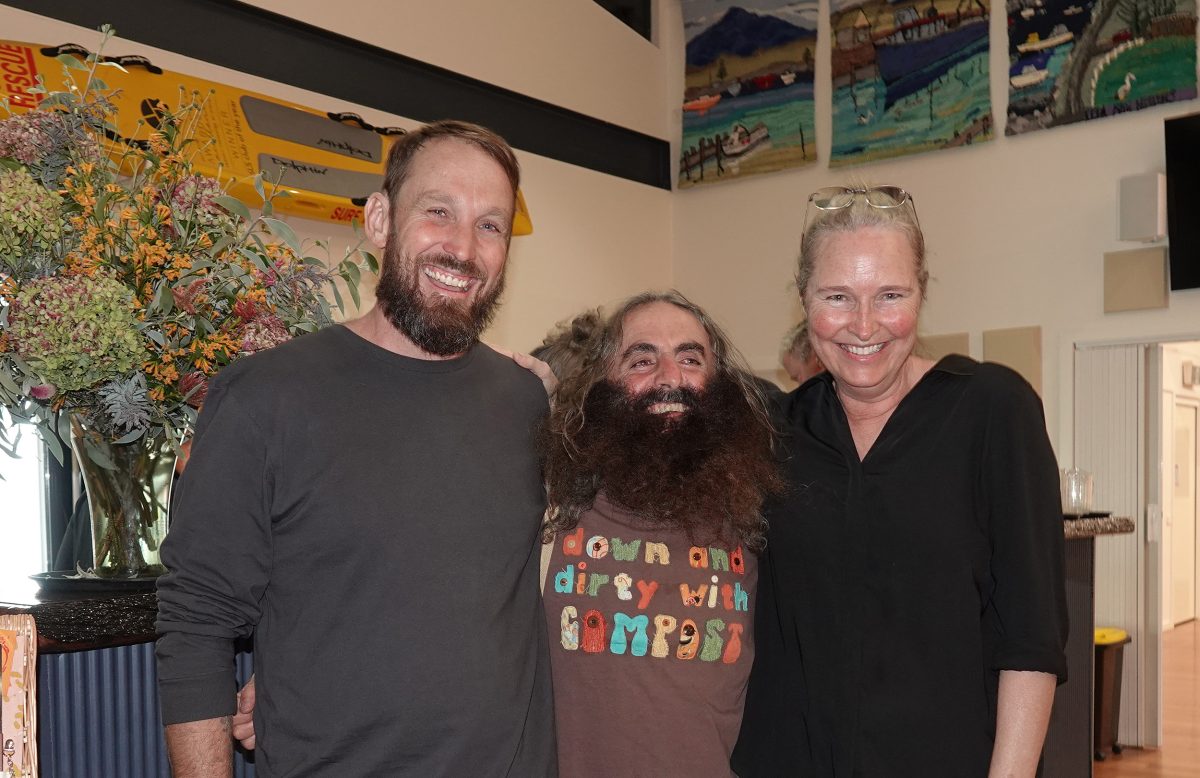
Radio and TV presenter Paul West, ABC’s Gardening Australia host Costa Georgiadis and Bermagui Preschool director/teacher Narelle Myers. Photo: Alison Kuiter.
The regulatory burden on preschools is growing to the extent that compliance is coming before care. “With all the things happening in the media, the knee-jerk reaction is more regulation, but they are Band-Aids,” Ms Myers said. “Policy development, quality improvement plans, data entry and chasing forms from parents all take away from the interface with children and quality of care.”
Worker retention payments have recently been introduced into the preschool sector. Ms Myers said it was a tiny step towards big change needed in the way preschool teachers were acknowledged and funded.
Preschool workers have been awarded a 15 per cent pay rise phased in over two years.
“Last year aged care workers got 30 per cent so it is a bit of a slap in the face for us,” she said. “We have very highly qualified educators doing very specific jobs and not being acknowledged for that.”
Bermagui Preschool has had a turnover of 30 staff in five years because people were being kicked out of rentals and must move away or because of rising living costs.
“With the state of housing and cost of living pressures, you can’t live on that wage,” Ms Myers said. “It isn’t sustainable, so people are leaving in droves.”
Ms Myers has written to state and federal representatives requesting increased funding and sustained support for Bermagui Preschool and the broader sector.







